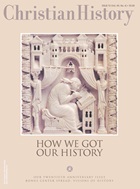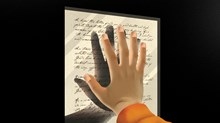Adolf von Harnack
(1851-1930)Harnack believed that the church had so obscured Jesus's message, only a ruthless criticism could possibly uncover it. Layer by layer, he peeled back church doctrines—ideas like the Resurrection, Christ's divinity, and the inspiration of Scripture—to find "the Gospel in the Gospel." Harnack's father believed his son had undermined Christianity altogether, and many of Harnack's peers agreed. For decades, though, his What is Christianity? was considered the definitive statement of liberal Protestantism.
Georges Florovsky
(1893-1979)Because Florovsky, a native Russian, worked from an Eastern Orthodox perspective, it took awhile for his thought to impact of the West. Yet his insistence on finding meaning in history and his emphasis on the continuing relevance of the church fathers combined to form a unique, and now influential, theology of history. "[P]recisely because history was apprehended as 'God's history,'" he wrote, "the 'history of man' was made possible."
Roland Bainton
(1894-1984)& Heiko Oberman
(1930-2001)In Here I Stand: A Life of Martin Luther, Bainton focuses on the Reformer's convictions: "Luther's principles in religion and ethics alike must constantly be borne in mind if he is not at times to appear unintelligible and even petty." Oberman makes more of context in his Luther: Man Between God and the Devil: "Luther is to be regarded not so much as a lonely prophet—let alone as the Hercules of the humanists—but as a leading member of the Wittenberg team which, in keeping with the motto of the university, initiated its program 'in the name of St. Paul and St. Augustine.'" Both books are essential reading on Luther, as both authors (in these books and in other work) contributed mightily to Reformation studies.
Hubert Jedin
(1900-1980)Did the Council of Trent represent a reactionary "Counter-Reformation" or a proactive "Catholic Reformation"? Jedin, a Catholic scholar, explored the question by investigating source materials and utilizing modern critical tools. His even-handed approach lifted this contentious subject out of polemics and opened a path for serious new consideration of the Reformation era.
Stephen Neill
(1900-1984)Missionary experience in India (where he faught with the legendary Amy Carmichael) and deep personal involvement in ecumenical causes led Neill to challenge the notion that Christianity belongs to the West. Like Kenneth Scott Latourette, he is known primarily for writing missions history (especially A History of Christian Missions, still used as a standard textbook), but he also added to New Testament studies and interfaith dialogue.
George Williams
(1914-2000)Williams believed that church history stood apart from other history, but he freely crossed many other boundaries. After Williams's death, his former student Timothy George wrote for the Harvard Divinity Bulletin, "A Unitarian who did not deny the Holy Trinity, [Williams] dared to write about 'sectarian ecumenicity,' 'wilderness and paradise,' 'evangelical rationalism,' 'Catholic liberalism,' and 'benignant Calvinism,' not to mention 'radical reformation.'" Williams made his most significant contributions writing on the last topic—his name for Anabaptism.
Jaroslav Pelikan
(1923- )Pelikan takes this quote from Goethe's Faust as his life motto: "What you have as heritage, Take now as task; For thus you will make it your own!" Pelikan applied this motto to his five- volume series, The Christian Tradition, which surveys church history from the first century to the twentieth—an audacious project in an age of scholarly specialization, but one that historian David Lotz (and many others) believes "commands the field" of present-day historiography.
Martin E. Marty
(1928- )The leading scholar of American public religion, Marty keeps a close eye on subjects like church-state interaction, civility, and fundamentalism. In three volumes on Modern American Religion, with a fourth coming, he privileges no group, focusing instead on the breadth of religious experience that has flourished in American society. His warmth toward pluralism upsets some evangelicals but accurately and often insightfully describes current trends in religion.
Copyright © 2001 by the author or Christianity Today/Christian History magazine.
Click here for reprint information on Christian History.

Support Our Work
Subscribe to CT for less than $4.25/month




























